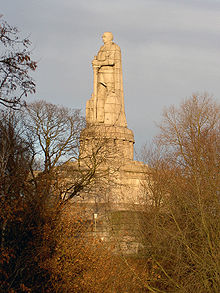
Back Otto von Bismarck Afrikaans Otto von Bismarck ALS ቢስማርክ Amharic Otto von Bismarck AN Odda of Bismearce ANG ओट्टो वॉन बिस्मार्क ANP أوتو فون بسمارك Arabic ؤطو فون بيسمارك ARY اوتو فون بيسمارك ARZ Otto von Bismarck AST
Otto von Bismarck | |
|---|---|
 | |
| Chancellor of the German Empire | |
| In office 21 March 1871 – 20 March 1890 | |
| Monarch | Wilhelm I Friedrich III Wilhelm II |
| Deputy | Otto Graf zu Stolberg-Wernigerode Karl Heinrich von Boetticher |
| Preceded by | Position established |
| Succeeded by | Leo von Caprivi |
| Minister President of Prussia | |
| In office 9 November 1873 – 20 March 1890 | |
| Monarch | Wilhelm I Friedrich III Wilhelm II |
| Preceded by | Albrecht von Roon |
| Succeeded by | Leo von Caprivi |
| In office 23 September 1862 – 1 January 1873 | |
| Monarch | Wilhelm I |
| Preceded by | Adolf zu Hohenlohe-Ingelfingen |
| Succeeded by | Albrecht von Roon |
| Chancellor of the North German Confederation | |
| In office 1 July 1867 – 21 March 1871 | |
| President | Wilhelm I |
| Preceded by | Position established |
| Succeeded by | Position abolished |
| Minister of Foreign Affairs | |
| In office 23 November 1862 – 20 March 1890 | |
| Prime Minister | Himself Albrecht von Roon |
| Preceded by | Albrecht von Bernstorff |
| Succeeded by | Leo von Caprivi |
| Personal details | |
| Born | Otto Eduard Leopold von Bismarck-Schönhausen 1 April 1815 Schönhausen, Kreis Jerichow II, Province of Saxony, Prussia (now Saxony-Anhalt, Germany) |
| Died | 30 July 1898 (aged 83) Friedrichsruh, Schleswig-Holstein, Germany |
| Political party | Independent |
| Spouse(s) | |
| Children | Marie Herbert Wilhelm |
| Parents | Karl Wilhelm Ferdinand von Bismarck (1771–1845) Wilhelmine Luise Mencken (1789–1839) |
| Alma mater | University of Göttingen University of Berlin University of Greifswald[1] |
| Profession | Lawyer |
| Signature | |

Prince Otto Eduard Leopold von Bismarck-Schönhausen Duke of Lauenburg, (1 April 1815 – 30 July 1898), was an aristocrat and statesman of the 19th century in Europe. As Prime Minister of Prussia from 1862 to 1890, he was most responsible for the uniting most of the many independent German countries into the new German Empire in 1871 and became its first chancellor until 1890.
He was Graf von Bismarck-Schönhausen (Count Bismarck-Schönhausen) in 1865. In 1871, he was Fürst von Bismarck (Prince Bismarck). In 1890, he became the Herzog von Lauenburg (Duke of Lauenburg). At first, he did not want to become a duke, but he accepted the title later.
- ↑ Steinberg, Jonathan (2011-06-01). Bismarck: A Life. p. 51. ISBN 9780199782529.